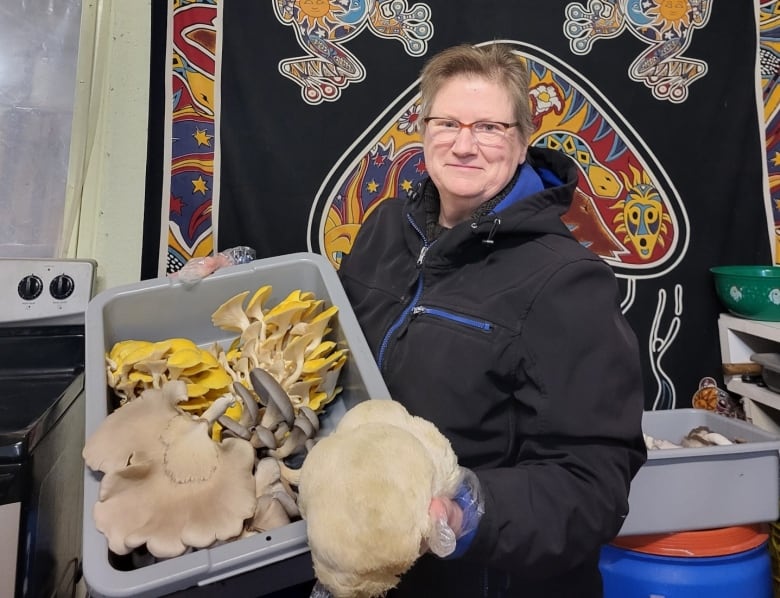[ad_1]
Some are wispy, and almost pillowy-white. Some are chocolatey black.
Depending on the type, they can taste like bacon, lobster, almonds — even hot peppers.
You can make furniture out of them. You can turn them into a hat. You can use them to clean up contaminated soil.
In a way, these sentences almost sound like a riddle. But actually, this is just a hint of what Portugal Cove, N.L. farmers Anita Walsh, Gerard Walsh, and their son Gerry Walsh have learned about edible mushrooms over the past four years.
“We’re just learning the tip of the tip of the tip of the iceberg,” Anita said. “Yeah, mushrooms are pretty amazing.”
At the moment, the Walsh family grows and sells a wide array of edible mushrooms at their farm, Windy Heights, including about ten oyster strains, shiitake, lion’s mane, enoki, red reishi and more. The mushrooms are all cultivated indoors, and can thrive in any season.
While the Walshes ran a 140-acre farm in Ontario for 15 years before moving to the province, the family said that initially, they didn’t know a whole lot about growing mushrooms.
“We were all saying, OK, well what can we grow in Newfoundland? It’s cold and damp. And Gerry pops up and says, ‘mushrooms grow in cold and damp!’ So we thought OK, let’s research that,” Anita said.

So Anita — a chartered accountant — crunched some numbers, concluding that growing gourmet mushrooms could be financially viable in the province, although as she pointed out, they weren’t eligible for financing “because mushrooms weren’t a proven industry here.”
Still, the Walshes were undaunted. They moved to Portugal Cove, set up an organic sod business to start off, and immersed themselves in learning to cultivate mushrooms indoors.
‘You gotta be clean as a daisy’
In nature, mushrooms typically expand and grow through underground mycelial networks. So to grow mushrooms indoors, Anita explained, “you’re replicating how mushrooms grow in the wild.”
“You need a mushroom spore, which is like a tiny, tiny seed, and you need to expand that into some grow medium,” she said. The family expands their mushrooms inside plastic bags packed with hardwood fuel pellets.
Pasteurization, sterilization, and other ways of combating contamination are also essential to the process, especially during the summer. Wayward spores from blooming plants can easily float inside and out-compete the mushrooms if the family isn’t careful, Anita said.
“When there’s goldenrod, that goldenrod comes inside and messes with what’s going on in here, too, and so you’re always fighting,” she explained. One time, she said, a friend wearing essential oil crossed paths with the mushrooms, and unwittingly contaminated an entire batch.
Now, the family maintains strict “biosecure” areas. They also diligently track all sources of potential contamination.
“You’re really being a scientist in that respect,” Anita said.

Farming beyond the plant and animal kingdoms
The family’s foray into mushroom farming hasn’t always been easy. In the first year, many batches succumbed to contamination. And in the early days, according to the older Gerald, the insurance company “pretty well shut us down,” he said.
“They did not understand what we’re doing. And they said that the mushroom is considered … a mold or spore. They would not insure us,” said Gerald Walsh. “We were down to the last week before we found someone else that would insure us for mushrooms.”
Since mushrooms are neither plant nor animal, they can slip outside standard agricultural categories. According to the Walshes, the challenge of defining mushrooms has led to further bureaucratic difficulties, too.
“We’d have Service N.L. say no, that’s got to be Agrifoods. Agrifoods says no, that’s not us — it’s got to be Service N.L. So you were bouncing back and forth because you were growing a crop that wasn’t really well-defined,” said Anita.
“That still causes problems. Because anytime there’s anything to do with mushrooms, they say ‘we don’t know how to categorize that, therefore we’re not going to deal with it.'”

Onward and upward
In spite of these challenges, the Walshes are expanding their mushroom setup at Windy Heights, thanks to some well-timed government funding. Going forward, they aim to sell dehydrated mushrooms province-wide and develop tinctures from mushrooms with medicinal benefits, such as lion’s mane. Plus, they’re hoping more people will treat themselves to a local, possibly unfamiliar mushroom variety.
“Our pink oysters — if you fry them, they taste like bacon,” said the younger Gerry Walsh. “The king oysters, they taste like a scallop. The lion’s mane tastes like lobster. It’s kind of endless,” he said.
“We’ve even had mushroom ice cream,” his mom Anita chimed in. “And oh my god, that was super delicious.”
St John’s Morning Show9:28Mushroom farmers
Combating airborne spores and eating mushroom ice cream. It’s all a day in the life for a family of indoor mushroom farmers. We hear from the Walsh’s at Windy Heights Farm in Portugal Cove.
[ad_2]
Source link




